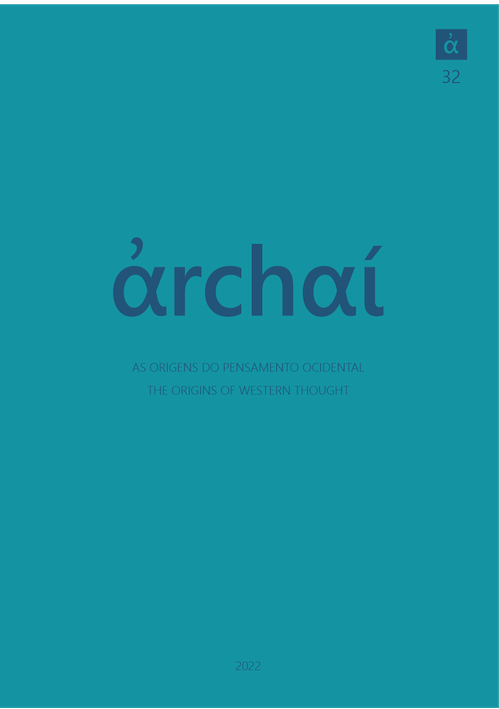The influence of the Anaxagorean denial of the génesis in Aristotelian physics
DOI:
https://doi.org/10.14195/1984-249X_32_15Keywords:
Anaxagoras, Aristotle, génesis, Aristotelian physicsAbstract
Physics I, the homogenization of disparate concepts of the first physicists, as part of the construction of his taxonomy of positions on principles. This propaedeutic strategy of the refutation consists in the assembly of a progression and a genealogy of the positions of the physicists from Eleatism. The main objective of this work is to show the specific meaning of the concept of separation in Anaxagoras' physics and the transformations that undergoes under Aristotelian criticism. In line with recent works such as those of Curd (2019) and Marmodoro (2017) that have drawn attention to the specificity of Anaxagoras' physical vocabulary, this research shows that the bases of his denial of genesis and its reworking in terms of separation and mix rest on original theses of his own physics. Both terminologically and conceptually, the notions of Anaxagorean separation and mixing cannot be exported to another physical theory.
Downloads
References
BARNES, J. (1982). The Presocratic Philosophers. New York, Routledge.
BASTIT, M. (2002). Les quatre causes de l'être selon la philosophie première d'Aristote. Louvain-la-Neuve, Peeters.
BERTI, E. (1991). Les méthodes d’argumentation et de démostration dans la Physique (apories, phénomènes, principes), La Physique d’Aristote et les conditions d’une science de la nature. Paris, Librairie Philosophique J. Vrin, 1991, p. 53-72.
BOERI, M. (2006). Aristóteles contra Parménides: el problema del cambio y la posibilidad de una ciencia física. Tópicos 30 bis, p. 45-68.
BOLTON, R. (1995). Aristotle’s Method in Natural Science: Physics I. In: JUDSON, L. (ed.), Aristotle’s Physics. A Collection of Essays. Oxford, Oxford University Press.
CALVO MARTÍNEZ, T. (2000). La noción de Physis en los orígenes de la filosofía griega. Δαίμων. Revista de filosofía, n. 21, p. 21-38.
CARTER, J. (2018). How Aristotle Changes Anaxagoras’s Mind. Apeiron 52, p. 1-28.
CHERNISS, H. (1935). Aristotle's criticism of presocratic philosophy. Baltimore, The Johns Hopkins Press.
CLEVE, F. (1973). The Philosophy of Anaxagoras. The Hague, Martinus Nijhoff.
COOPER, J. (2012). Conclusion and Retrospect: Metaphysics A.10. In: STEEL, C.; PRIMAVESI, O. (eds.), Aristotle’s Metaphysics Alpha: Symposium Aristotelicum. Oxford, Oxford University Press, p. 336–365.
CORDERO, N. (2011). Una consecuencia inesperada de la reconstrucción actual del Poema de Parménides. Hypnos 27, p. 222-229.
CURD, P., (2007). Anaxagoras of Clazomenae: Fragments. Text and Translation with Notes and Essays. Toronto, University of Toronto Press.
CURD, P., (2019). Anaxagoras. The Stanford Encyclopedia of Philosophy (Winter 2019 Edition), Edward N. Zalta (ed.). Available at https://plato.stanford.edu/archives/win2019/entries/anaxagoras/. Accessed on 05/08/2020
GRAHAM, D. W. (1994). The Postulates of Anaxagoras. Apeiron 27, p. 77–121.
GOMES, G. (2016). The philosopher, his predecessors, the commentator and his critics: on the criticism of Harold Cherniss’s critique of Aristotle as a source for early Greek philosophy. Anais de Filosofia Clássica 10, n. 19, p. 76-93.
GUTHRIE, W. K. C. (1957). Aristotle as a Historian of Philosophy: Some Preliminaries. Journal of Hellenic Studies, n. 77, p. 35–41
GUTHRIE, W. (1965). A History of Greek Philosophy, vol. II. Cambridge, Cambridge University Press.
MANSFELD, J. (2010). Aëtius, Aristotle and Others on Coming-to-be and Passing-away. Aëtiana: The Method and Intellectual Context of a Doxographer, vol. III. Leiden, Brill, p. 415-446.
MARMODORO, A. (2015). Anaxagoras’s Qualitative Gunk. British Journal for the History of Philosophy, 23, p. 402–422.
MARMODORO, A., (2017). Everything in Everything: Anaxagoras’s Metaphysics. New York, Oxford University Press.
NADDAF, G. (2005). The Greek concept of nature. Albany, State University of New York Press.
O’BRIEN, D. (1968). The Relation of Anaxagoras and Empedocles. The Journal of Hellenic Studies 88, p. 93-113.
PALMER, J. (2009). Parmenides and Presocratic Philosophy. Oxford, Oxford University Press.
RUNIA, D. T. (2008). The Sources for Presocratic Philosophy. In: CURD, P.; GRAHAM, D., The Oxford Handbook of Presocratic Philosophy. Oxford, Oxford University Press, p. 27–54.
SEDLEY, D. (2007). Creationism and Its Critics in Antiquity. Berkley: University of California Press
SISKO, J. E. (2013). Anaxagoras and Empedocles in the Shadow of Elea. In: Warren, J.; Sheffield, F. (eds.) Routledge Companion to Ancient Philosophy. London, Routledge, p. 49-64.
SPANGENBERG, P. (2017). La torsión eleática: la dialéctica fuerte ejercida por Platón y Aristóteles frente al adversario monista. Hypnos 39, p. 220 – 237.
THANASSAS, P. (2007). Parmenides, Cosmos, and Being: A Philosophical Interpretation. Milwaukee, Marquette University Press.
WILLIAMS, C. J. F. (1982) Aristotle’s De Generatione et Corruptione. Oxford, Clarendon Press.
ZELLER, E. (1892). Die Philosophie der Griechen in ihrer geschichtlichen Entwicklung, i. Vorsokratische Philosophie. Zweite Hälfte. 5th ed. Leipzig, O. R. Reisland.
Downloads
Published
How to Cite
Issue
Section
License
Copyright (c) 2022 María Elena Díaz

This work is licensed under a Creative Commons Attribution 4.0 International License.
Given the public access policy of the journal, the use of the published texts is free, with the obligation of recognizing the original authorship and the first publication in this journal. The authors of the published contributions are entirely and exclusively responsible for their contents.
1. The authors authorize the publication of the article in this journal.
2. The authors guarantee that the contribution is original, and take full responsibility for its content in case of impugnation by third parties.
3. The authors guarantee that the contribution is not under evaluation in another journal.
4. The authors keep the copyright and convey to the journal the right of first publication, the work being licensed under a Creative Commons Attribution License-BY.
5. The authors are allowed and stimulated to publicize and distribute their work on-line after the publication in the journal.
6. The authors of the approved works authorize the journal to distribute their content, after publication, for reproduction in content indexes, virtual libraries and similars.
7. The editors reserve the right to make adjustments to the text and to adequate the article to the editorial rules of the journal.



